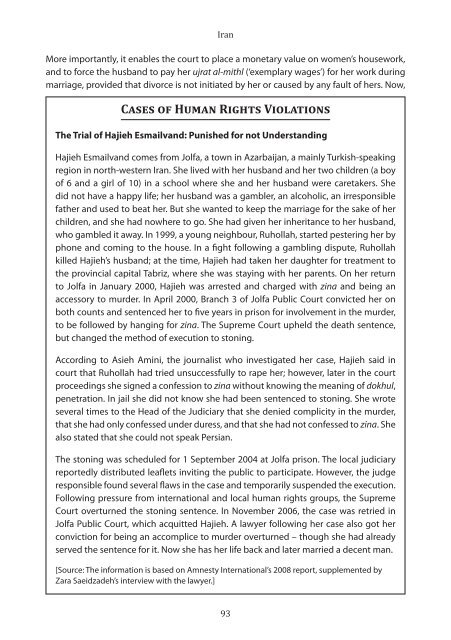control and sexuality
control and sexuality
control and sexuality
- No tags were found...
You also want an ePaper? Increase the reach of your titles
YUMPU automatically turns print PDFs into web optimized ePapers that Google loves.
IranMore importantly, it enables the court to place a monetary value on women’s housework,<strong>and</strong> to force the husb<strong>and</strong> to pay her ujrat al-mithl (‘exemplary wages’) for her work duringmarriage, provided that divorce is not initiated by her or caused by any fault of hers. Now,Cases of Human Rights ViolationsThe Trial of Hajieh Esmailv<strong>and</strong>: Punished for not Underst<strong>and</strong>ingHajieh Esmailv<strong>and</strong> comes from Jolfa, a town in Azarbaijan, a mainly Turkish-speakingregion in north-western Iran. She lived with her husb<strong>and</strong> <strong>and</strong> her two children (a boyof 6 <strong>and</strong> a girl of 10) in a school where she <strong>and</strong> her husb<strong>and</strong> were caretakers. Shedid not have a happy life; her husb<strong>and</strong> was a gambler, an alcoholic, an irresponsiblefather <strong>and</strong> used to beat her. But she wanted to keep the marriage for the sake of herchildren, <strong>and</strong> she had nowhere to go. She had given her inheritance to her husb<strong>and</strong>,who gambled it away. In 1999, a young neighbour, Ruhollah, started pestering her byphone <strong>and</strong> coming to the house. In a fight following a gambling dispute, Ruhollahkilled Hajieh’s husb<strong>and</strong>; at the time, Hajieh had taken her daughter for treatment tothe provincial capital Tabriz, where she was staying with her parents. On her returnto Jolfa in January 2000, Hajieh was arrested <strong>and</strong> charged with zina <strong>and</strong> being anaccessory to murder. In April 2000, Branch 3 of Jolfa Public Court convicted her onboth counts <strong>and</strong> sentenced her to five years in prison for involvement in the murder,to be followed by hanging for zina. The Supreme Court upheld the death sentence,but changed the method of execution to stoning.According to Asieh Amini, the journalist who investigated her case, Hajieh said incourt that Ruhollah had tried unsuccessfully to rape her; however, later in the courtproceedings she signed a confession to zina without knowing the meaning of dokhul,penetration. In jail she did not know she had been sentenced to stoning. She wroteseveral times to the Head of the Judiciary that she denied complicity in the murder,that she had only confessed under duress, <strong>and</strong> that she had not confessed to zina. Shealso stated that she could not speak Persian.The stoning was scheduled for 1 September 2004 at Jolfa prison. The local judiciaryreportedly distributed leaflets inviting the public to participate. However, the judgeresponsible found several flaws in the case <strong>and</strong> temporarily suspended the execution.Following pressure from international <strong>and</strong> local human rights groups, the SupremeCourt overturned the stoning sentence. In November 2006, the case was retried inJolfa Public Court, which acquitted Hajieh. A lawyer following her case also got herconviction for being an accomplice to murder overturned – though she had alreadyserved the sentence for it. Now she has her life back <strong>and</strong> later married a decent man.[Source: The information is based on Amnesty International’s 2008 report, supplemented byZara Saeidzadeh’s interview with the lawyer.]93


